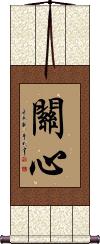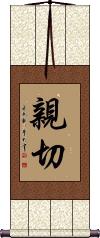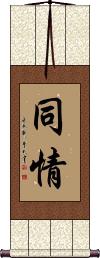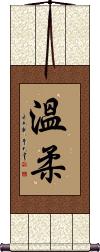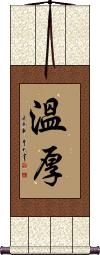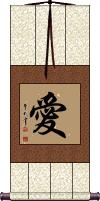Many custom options...
And formats...

Caring in Chinese / Japanese...
Buy a Caring calligraphy wall scroll here!
Personalize your custom “Caring” project by clicking the button next to your favorite “Caring” title below...
Caring
關心 means caring in Chinese.
Caring is giving love and attention to people and things that matter to you and anyone who needs help. When you care about people, you help them. You do a careful job, giving your very best effort. You treat people and things gently and respectfully. Caring makes the world a safer place.
Note: 關心 is also a word in Korean Hanja, but in Korean, it means taking interest or concern. In Korean, it's still a good word, but it doesn't quite have the “caring for a person” meaning that it does in Chinese.
See Also: Benevolence | Altruism
Kindness / Caring
親切 is a Chinese/Japanese/Korean word that can also mean affectionate, cordial, warm, or close (emotionally).
Kindness shows you care and are doing some good to make life better for others. Be thoughtful about people's needs. Show love and compassion to someone who is sad or needs your help. When you are tempted to be cruel, to criticize or tease, decide to be kind instead.
See Also: Love | Benevolence
Compassion
These two characters mean compassion and sympathy in Chinese, Japanese, and Korean, which makes this word universal.
Compassion is caring and understanding someone is hurt or troubled (even if you don't know them). It is wanting to help, even if all you can do is listen and say kind words. You forgive mistakes. You are a friend when someone needs a friend.
See Also: Kindness
Gentleness
Gentleness
溫厚 is a Chinese, Japanese, and old Korean word for gentle or gentleness.
This can also mean “kindness” (more as an adjective like “kind person”).
![]() The modern Japanese version of the first character looks like the one to the right. If you want this modern Japanese form, just click on that Kanji instead of the button above.
The modern Japanese version of the first character looks like the one to the right. If you want this modern Japanese form, just click on that Kanji instead of the button above.
See Also: Kindness
Helpfulness
樂於助人 is about helpfulness, being of service to others, and doing thoughtful things that make a difference in their lives.
Offer your help without waiting to be asked. Ask for help when you need it. When we help each other, we get more done. We make our lives easier.
See Also: Charity | Benevolence
Love
愛 universally means love in Chinese, Japanese Kanji, old Korean Hanja, and old Vietnamese.
愛 is one of the most recognized Asian symbols in the West and is often seen on tee shirts, coffee mugs, tattoos, and more.
愛 can also be defined as affection, to be fond of, to like, or to be keen on. It often refers to romantic love, and is found in phrases like, “I love you.” But in Chinese, one can say, “I love that movie” using this character as well.
This can also be a pet name or part of a pet name in the way we say “dear” or “honey” in English.
This can be a girl’s name “Ai” in both Chinese and Japanese.
More about this character:
This may be hard to imagine as a westerner but the strokes at the top of this love character symbolize family & marriage.
![]() The symbol in the middle is a little easier to identify. It is the character for "heart" (it can also mean "mind" or "soul"). I guess you can say that no matter if you are from the East or the West, you must put your heart into your love.
The symbol in the middle is a little easier to identify. It is the character for "heart" (it can also mean "mind" or "soul"). I guess you can say that no matter if you are from the East or the West, you must put your heart into your love.
![]() The strokes at the bottom create a modified character that means "friend" or "friendship."
The strokes at the bottom create a modified character that means "friend" or "friendship."
I suppose you could say that the full meaning of this love character is to love your family, spouse, and friends with all of your heart, since all three elements exist in this character.
See Also: I Love You | Benevolence | Friendliness | Double Happiness Happy Marriage Wall Scroll
Not the results for caring that you were looking for?
Below are some entries from our dictionary that may match your caring search...
| Characters If shown, 2nd row is Simp. Chinese |
Pronunciation Romanization |
Simple Dictionary Definition |
慈母 see styles |
cí mǔ ci2 mu3 tz`u mu tzu mu jibo じぼ |
More info & calligraphy: Loving Mother(See 慈父) affectionate mother |
介意 see styles |
jiè yì jie4 yi4 chieh i kaii / kai かいい |
to care about; to take offense; to mind (noun, transitive verb) worrying about; caring about |
介護 see styles |
kaigo かいご |
(noun, transitive verb) nursing; care; caregiving; caring |
体養 see styles |
taiyou / taiyo たいよう |
development of the body; caring for one's body |
加養 see styles |
kayou / kayo かよう |
(noun/participle) caring for the sick; taking care of oneself; (place-name, surname) Kayou |
加餐 see styles |
jiā cān jia1 can1 chia ts`an chia tsan kasan かさん |
to have an extra meal; snack (n,vs,vi) caring for one's health |
反哺 see styles |
fǎn bǔ fan3 bu3 fan pu hanpo はんぽ |
to support one's parents in their old age; to show filial piety; to to repay; to return a favor caring for one's parents in return; (given name) Hanpo |
愍心 see styles |
mǐn xīn min3 xin1 min hsin minshin |
caring mind |
愛玩 see styles |
aigan あいがん |
(noun/participle) caring for (esp. a pet or a small object); cherishing; being fond of; prizing; treasuring |
愛翫 see styles |
aigan あいがん |
(noun/participle) caring for (esp. a pet or a small object); cherishing; being fond of; prizing; treasuring |
知心 see styles |
zhī xīn zhi1 xin1 chih hsin tomomi ともみ |
caring; intimate (female given name) Tomomi |
六和敬 see styles |
liù hé jìng liu4 he2 jing4 liu ho ching roku wakyō |
(六和) The six points of reverent harmony or unity in a monastery or convent: 身 bodily unity in form of worship, 口 oral unity in chanting, 意 mental unity in faith, 戒 moral unity in observing the commandments, 見 doctrinal unity in views and explanations, and 利, 行, 學, or 施 economic unity in community of goods, deeds, studies, or charity. |
愛がん see styles |
aigan あいがん |
(noun/participle) caring for (esp. a pet or a small object); cherishing; being fond of; prizing; treasuring |
看取り see styles |
mitori みとり |
(1) nursing; caring for the sick; (2) deathwatch; attendance at a deathbed |
不顧論宗 不顾论宗 see styles |
bù gù lùn zōng bu4 gu4 lun4 zong1 pu ku lun tsung fu koron shū |
One of the 因明四宗, a philosophical school, whose rule was self-gratification, 'not caring for' others. |
平ちゃら see styles |
heichara / hechara へいちゃら |
(adjectival noun) (1) (kana only) (rare) (See へっちゃら・1) unconcerned (about); unbothered; unworried; nonchalant; not caring; not minding; (adjectival noun) (2) (kana only) (rare) (See へっちゃら・2) easy; simple |
心のケア see styles |
kokoronokea こころのケア |
(exp,n) emotional care; emotional support; caring for someone's mental well-being |
愛情深い see styles |
aijoubukai; aijoufukai / aijobukai; aijofukai あいじょうぶかい; あいじょうふかい |
(adjective) loving; caring; devoted |
淡泊名利 see styles |
dàn bó míng lì dan4 bo2 ming2 li4 tan po ming li |
not caring about fame and fortune (idiom); indifferent to worldly rewards |
深情款款 see styles |
shēn qíng kuǎn kuǎn shen1 qing2 kuan3 kuan3 shen ch`ing k`uan k`uan shen ching kuan kuan |
loving; caring; adoring |
自主療養 see styles |
jishuryouyou / jishuryoyo じしゅりょうよう |
caring for oneself (at home; e.g. after testing positive for COVID-19) |
貼心貼肺 贴心贴肺 see styles |
tiē xīn tiē fèi tie1 xin1 tie1 fei4 t`ieh hsin t`ieh fei tieh hsin tieh fei |
considerate and caring; very close; intimate |
金錢掛帥 金钱挂帅 see styles |
jīn qián guà shuài jin1 qian2 gua4 shuai4 chin ch`ien kua shuai chin chien kua shuai |
caring only about money and wealth |
閉門造車 闭门造车 see styles |
bì mén zào chē bi4 men2 zao4 che1 pi men tsao ch`e pi men tsao che |
lit. to shut oneself away and build a cart (idiom); fig. to work on a project in isolation, without caring for outside realities |
へっちゃら see styles |
hecchara へっちゃら |
(adjectival noun) (1) unconcerned (about); unbothered; unworried; nonchalant; not caring; not minding; (adjectival noun) (2) easy; simple |
気にしない see styles |
kinishinai きにしない |
(exp,adj-i) (See 気にする) not caring; not giving a damn |
気にもしない see styles |
kinimoshinai きにもしない |
(exp,adj-i) (See 気にする) not care; not caring |
気にもとめず see styles |
kinimotomezu きにもとめず |
(expression) paying no heed to; not caring about; taking no notice of |
気にも留めず see styles |
kinimotomezu きにもとめず |
(expression) paying no heed to; not caring about; taking no notice of |
面倒見がいい see styles |
mendoumigaii / mendomigai めんどうみがいい |
(exp,adj-ix) (See 面倒見のいい・めんどうみのいい) very helpful; caring; service-minded |
Click here for more caring results from our dictionary
The following table may be helpful for those studying Chinese or Japanese...
| Title | Characters | Romaji (Romanized Japanese) | Various forms of Romanized Chinese | |
| Caring | 關心 关心 | guān xīn / guan1 xin1 / guan xin / guanxin | kuan hsin / kuanhsin | |
| Kindness Caring | 親切 亲切 | shin setsu / shinsetsu | qīn qiè / qin1 qie4 / qin qie / qinqie | ch`in ch`ieh / chinchieh / chin chieh |
| Compassion | 同情 | dou jou / doujou / do jo | tóng qíng tong2 qing2 tong qing tongqing | t`ung ch`ing tungching tung ching |
| Gentleness | 溫柔 温柔 | wēn róu / wen1 rou2 / wen rou / wenrou | wen jou / wenjou | |
| Gentleness | 溫厚 温厚 | on kou / onkou / on ko | wēn hòu / wen1 hou4 / wen hou / wenhou | |
| Helpfulness | 樂於助人 乐于助人 | lè yú zhù rén le4 yu2 zhu4 ren2 le yu zhu ren leyuzhuren | le yü chu jen leyüchujen |
|
| Love | 愛 爱 | ai | ài / ai4 / ai | |
| In some entries above you will see that characters have different versions above and below a line. In these cases, the characters above the line are Traditional Chinese, while the ones below are Simplified Chinese. | ||||
Successful Chinese Character and Japanese Kanji calligraphy searches within the last few hours...
